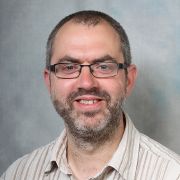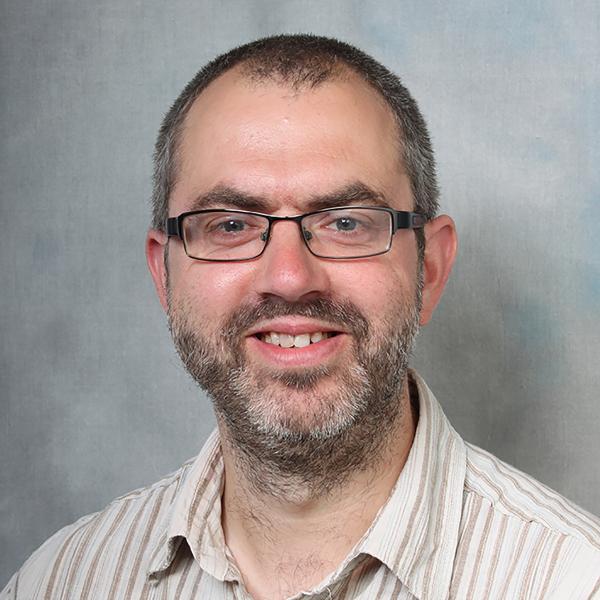Dr Colin J. Crook
School of Mathematical and Physical Sciences
Chemistry PostGraduate Taught Programmes Director
University Teacher


Full contact details
School of Mathematical and Physical Sciences
Dainton Building
13 Brook Hill
Sheffield
S3 7HF
- Profile
-
Dr. Crook obtained a BSc in Chemistry with Polymer Chemistry in 1995. This was followed by a MSc in polymer chemistry from Lancaster University and a PhD from Aston University in 2000. In 2000 he became a postdoctoral research associate at the University of Sheffield working, a post held until 2006. His research centred around polymer synthesis and responsive polymers, and he was involved in the exciting Wonderland project at the art-science interface.
In 2007 he was appointed as a University Teacher in physical chemistry. He is fortunate to lecture in some of his favourite areas of chemistry, namely smart polymers and polymer characterisation, and runs the Level 2 physical chemistry laboratory and the MSc polymer laboratory. He is currently the Director of Studies for the MSc: Polymers for Advanced Technologies.
- Publications
-
Journal articles
- Synthesis, characterization and swelling behaviour of poly(methacrylic acid) brushes synthesized using atom transfer radical polymerization. POLYMER, 50(4), 1005-1014.


- Direct visualization of the real time swelling and collapse of a poly(methacrylic acid) brush using atomic force microscopy. SOFT MATTER, 5(2), 296-299.


- Antagonistic triblock polymer gels powered by pH oscillations. MACROMOLECULES, 40(13), 4393-4395.


- The pH-induced swelling and collapse atom transfer radical polymerization. SOFT MATTER, 2(12), 1076-1080.


- PMSE 153-Analysis of the effect of temperature on the weathering of polymeric materials. ABSTR PAP AM CHEM S, 232, 506-506.


- Controlled growth of poly (2-(diethylamino)ethyl methacrylate) brushes via atom transfer radical polymerisation on planar silicon surfaces. POLYM INT, 55(7), 808-815.


- A toolbox approach to adhesive design. REACT FUNCT POLYM, 66(1), 41-49.


- Reciprocating power generation in a chemically driven synthetic muscle.. Nano Lett, 6(1), 73-77.


- Mechanical actuation by responsive polyelectrolyte brushes and triblock gels. J MACROMOL SCI PHYS, B44(6), 1103-1121.


- Responsive brushes and gels as components of soft nanotechnology.. Faraday Discuss, 128, 55-74.


- Production of mechanical work via a pH-sensitive hydrogel coupled to a non-linear kinetic system.. ABSTR PAP AM CHEM S, 224, U427-U427.


- Chemically induced oscillations in a pH-responsive hydrogel. PHYS CHEM CHEM PHYS, 4(8), 1367-1369.


- The use of a nonlinear kinetic system to produce mechanical work via a pH-sensitive hydrogel. American Chemical Society Polymer Preprints Division of Polymer Chemistry, 43(2), 804-805.


Conference proceedings
- Autonomous volume transitions of a polybase triblock copolymer gel in a chemically driven pH-oscillator. MACROMOLECULAR SYMPOSIA, Vol. 256 (pp 95-104)


- Measurement of force produced by a pH-responsive hydrogel in a pH oscillator. NONLINEAR DYNAMICS IN POLYMERIC SYSTEMS, Vol. 869 (pp 71-79)


- Synthesis, characterization and swelling behaviour of poly(methacrylic acid) brushes synthesized using atom transfer radical polymerization. POLYMER, 50(4), 1005-1014.
- Teaching interests
-
Physical Chemistry Laboratory; Polymer Chemistry.
- Teaching activities
-
Undergraduate and postgraduate taught modules
- Level 2 Physical Chemistry Laboratories: In the second year, students use their observational, analytical and critical skills to probe some of the fundamental concepts of Physical Chemistry such as thermochemistry, kinetics and material properties. They also become practised in the art of data analysis and the communication of those results to others.
- Smart Polymers and Polymeric Materials (Postgraduate Level)
This unit teaches students about the ways in which individual polymer chains and polymer-based materials can respond to a variety of external stimuli such as heat, light, sound, electric field, pH and ionic strength, and the uses which can be made of these effects in the design and applications of "smart" (both passive and active) materials and devices.
Support Teaching:
- Tutorials: Level 2 Physical Chemistry.
- Level 3 Literature Review
Laboratory Teaching:
- Level 2 Organic Laboratories
- Level 2 Physical Laboratories
- Level 3 Inorganic Laboratories
- Postgraduate Level Laboratories
